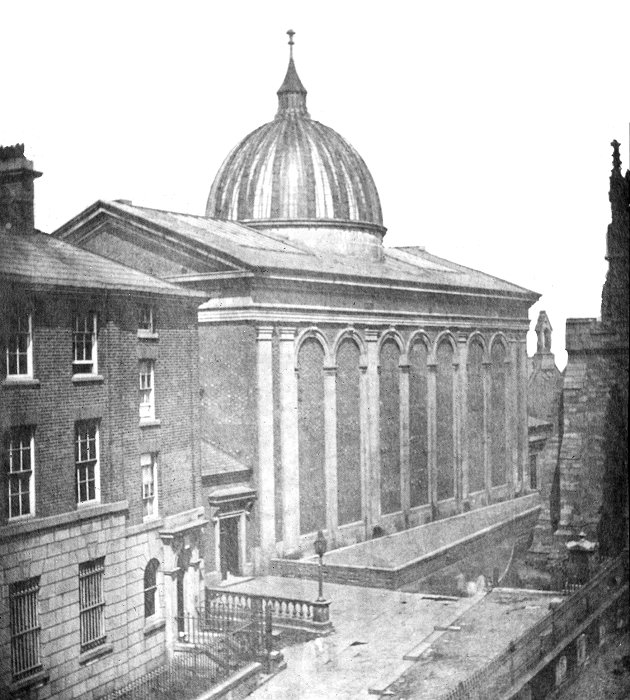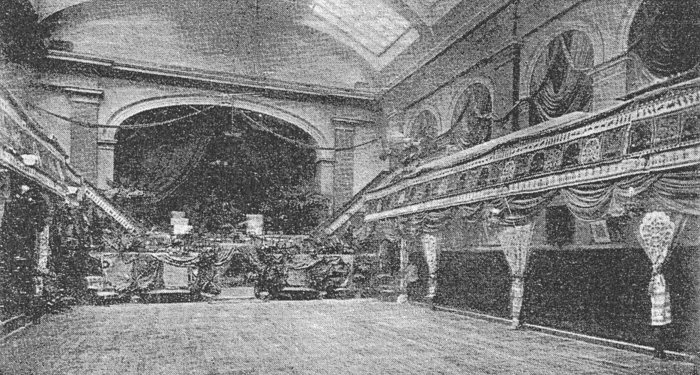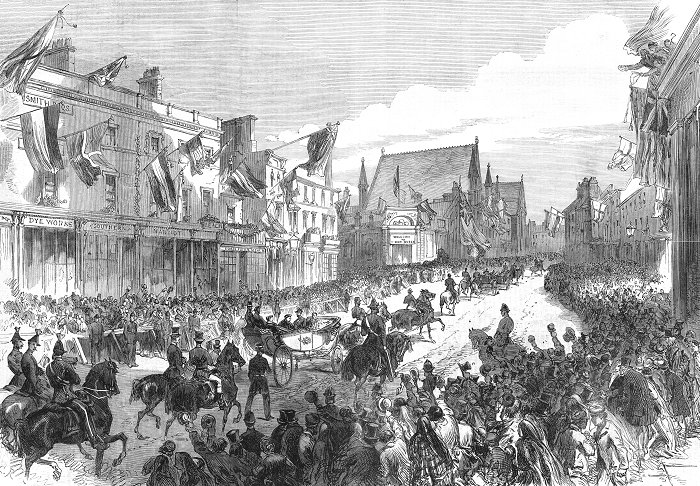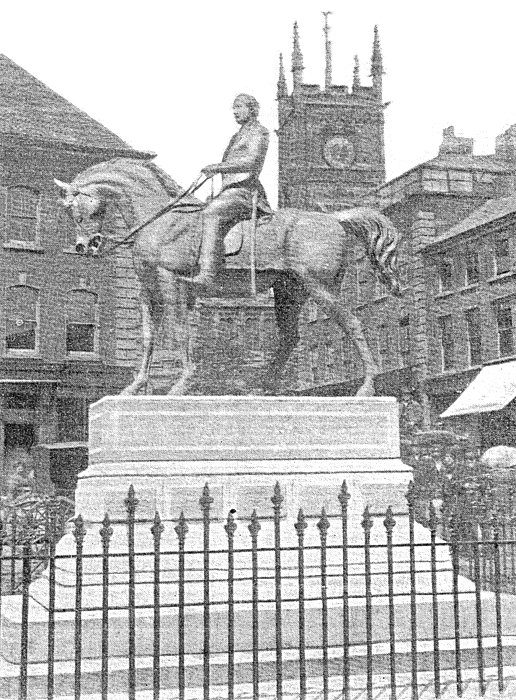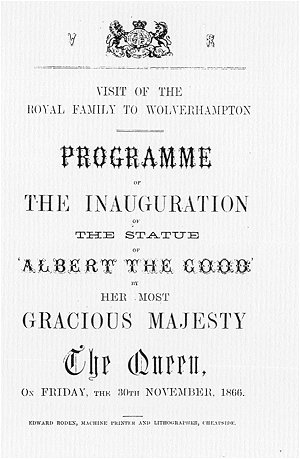The Rev. A. B. Gould having said grace, Sir John Morris rose and said: "My Lords, Ladies, and Gentlemen; I rise to propose a toast which I know will be received in this room with enthusiastic emotions of sympathy and joy. In doing so let me say, as the representative of the town of which I have the honour to be the Mayor, that I am sure we shall drink this toast, not as it is sometimes drunk, as a matter of form, but as those who feel that our nation is deeply interested in the desire we express, that her gracious Majesty may long enjoy the blessing of health. (Loud cheers.) And have we not cause for wishing so? (hear, hear) for as a nation we are essentially loyal. We have found by long experience that whatever the defects our Constitution and Government may be, we enjoy the blessings of personal liberty, prosperity, and happiness, and therefore for our own sake, from the highest peer in the realm to the apprentice in the shop, every Englishman has cause to say ‘God Save the Queen.’ (Cheers.) But then there are considerations which intensify our loyalty and joy. We have a Queen whose Palace, whose Court, have for a long series of years been a perfect model of domestic virtue, purity, and excellence (loud cheers) and therefore, considering the influence of Her Majesty's example throughout the land, I venture to say there is no parent in Great Britain with a particle of right feeling but is prepared, on this ground. also, to join heart and soul in the prayer, ‘God Save the Queen.’ Nor is this all.
We must remember that not only is Her Majesty our Queen, but in the inscrutable providence of God, she is our widowed Queen, and that she has this day unveiled the statue which we have erected in our midst in token of gratitude to God for giving us for a time one who proved himself so great a Prince, so good a husband, and so wise a father. (Loud applause.) But we must not forget that, that very act must have brought to Her Majesty's recollection the loss which as long as she lives she will have to deplore. Deep sympathy, therefore, will blend with our earnest prayer, when we say ‘God save the Queen.’ (Cheers.) And while every subject in the land will join in this sentiment, we shall make it, in a peculiar sense, our own. (Applause.) Our town has the honour of being the first in England which has had the opportunity of welcoming back Her Majesty to public life after a long and painful seclusion. (Great applause.) I cannot trust myself to advert to the great honour which has been conferred upon me this day (renewed applause) but would say that while I feel a signal honour has been conferred upon myself, I also feel that it is a mark of great respect towards our town. (Cheers.) I will, therefore, only add the prayer that God may long preserve the Queen and her Royal house in health and prosperity; and that, I am sure, is the earnest desire of the inhabitants of Wolverhampton" The toast was drunk with repeated rounds of cheering. After a short interval, Sir John again rose and said: "I have the honour to propose the health of those, who, after our Gracious Queen, are most justly entitled to our loyal affection, 'The Prince and Princess of Wales and the rest of the Royal Family.' (Cheers.) The eyes of Great Britain rest on His Royal Highness the Prince of Wales, the future monarch of this realm. May the day of his accession be far distant (applause) but when in the providence of God it does come, we can wish nothing more conducive to his own happiness, or to the happiness of this nation, than that he should walk in the footsteps of his Royal parents. May the lives of the Prince and Princess of Wales and the rest of the Royal Family ever shed lustre on our country; and when the Prince ascends the Throne, may he, like his illustrious parents, command the admiration and affection of a loyal and devoted people." (Loud cheers.) The Recorder proposed the next toast. He said: "Mr. Mayor, my Lords, Ladies, and Gentlemen, I have been requested to propose a toast which I am sure you will receive with pleasure equal to that which I have in proposing it; and the more so because I feel it would be as presumptuous in me to enlarge upon it, as you would deem it unnecessary that I should do so. It is ‘The Health of the Bishop and Clergy of the Diocese.’ You will all feel with me that in proposing to you the health of the Right Rev. the Lord Bishop of Lichfield, I am proposing to you the health of one who has spent a long life, not only in the profession, but in the practice of Christian virtue. (Applause.) I feel sure also that when I
name to you the Clergy of this diocese, you will agree with me that they
are a body of men whose doctrines and whose lives coincident, exhibit
lucid proof that they are honest in the sacred cause. (Loud applause.)
My official duties in connection with this borough give me opportunities
of hearing much of what the clergy are doing, and I believe that there
is no diocese in the land, and, I am proud to add, no town in the
diocese in which the clergy more honestly and faithfully perform their
duty than in the diocese of Lichfield and the town of Wolverhampton.
(Applause.) Therefore, without enlarging to you upon merits with which
you are even more perfectly acquainted than myself, I ask you to join me
in drinking ‘The Health of the Bishop and Clergy of the Diocese.’" (Loud
applause.) "On the part of the clergy of this diocese and myself, I thank you for the toast which has been so kindly proposed and so cordially received. I am sure, ladies and gentlemen, you will not expect me to speak at large upon the occasion which has called us together today. I could say nothing upon it but what you all know and feel; but this I will say, that no persons can have taken a more cordial interest in today's proceedings, or have sympathised more heartily with them, than the clergy.
The clergy must be a loyal body. The clergy cannot forget that the commands to fear God and to honour the King are joined closely together; and the clergy know full well that, so to speak; there is a natural connection between the two, the one leading to the other. I should also like to say that this day has not only been an occasion of our, love for our Queen, our respect for her officially, and our love for her personally (applause) but it has this great recommendation also, that it brings together people of different opinions and different views on most matters. We differ on politics, we differ on higher matters than politics but one great lesson we all have to learn and practice is to think as little as we possibly can of our differences, and as much as we possibly can upon those things on which we are all agreed. It is a great happiness that we can meet together and agree cordially upon an occasion like this. It is a great blessing, and we should all turn it to account. I will not detain you with a long speech, but will only venture to say that I hope we shall go away from this meeting thankful for the opportunity we have had of celebrating the memory of a great and good Prince, and also with a sincere desire of cultivating, as much as we possibly can, without the sacrifice of principle, cordiality and brotherly kindness towards each other." (Loud applause.) The Lord Lieutenant, on rising to propose a toast which was not on the list, said: "He was somewhat out of order, but he thought he should be excused when he told them that his object was to ask them to join him in drinking, ‘Health and long life to Sir John Morris, Mayor of Wolverhampton.’ (Loud applause.) He need say very little in the way of congratulation to the town on the great honour which had that day been conferred upon it; that honour was of too distinguished a character to require any words from him in speaking of it; but he would say it was an honour upon which not only Wolverhampton, but the nation at large, was to be congratulated. (Hear, hear, and applause.) He was perfectly convinced that there was no one in the whole community but would rejoice at the honour conferred on the Borough of Wolverhampton this day by Her Majesty having in its favour, for the first time, quitted that seclusion which had been so consistent with her deep sorrow and great bereavement, but which had undoubtedly deprived the people of this country, on many occasions, of the great gratification they always experience in receiving their Sovereign. He firmly believed that there was no way in which the deep attachment so unmistakably exhibited by the people of this country, whenever occasion presented itself, towards their Queen, could be so well and so graciously reciprocated as by Her Majesty granting them that gratification which her presence amongst them invariably affords to her faithful subjects. (Hear, hear.) He could not refrain from congratulating the people of Wolverhampton upon the admirable reception which Her Majesty had met there that day. (Applause.)
He had the pleasure and the honour of following Her Majesty's carriage through the whole length of the procession, and would undertake to say that of all the occasions on which she had appeared in public she had never received a more gratifying welcome. (Loud applause.) They had met on that occasion with but one object in view to do honour to the Queen, and were they to occupy the time in paying compliments to each other, they would be doing that which would not only be unnecessary but inappropriate to the occasion. He must, however, congratulate the Mayor upon the events of the day, and in doing so must be allowed to express an opinion that it was mainly owing to the great courtesy and consideration which the Mayor had invariably shown towards everybody with whom he had been connected in making the arrangements for the reception of Her Majesty that the day's success ways due. As one of those who had taken, part in those arrangements, he begged most sincerely to thank Sir John Morris, and he heartily drank health and long life to him, and prosperity to the town which, by having placed him in the high and responsible position of its Chief Magistrate; had been the means of enabling Her Majesty to confer upon him, with her own hands, a distinguished honour." The toast was drunk with loud and prolonged cheering, the company standing, and followed by "one cheer more for Lady Morris." Sir John Morris, on rising to acknowledge the toast, was again greeted
with hearty applause. He said: Little did I imagine when I first assisted in the public affairs of this my native town, that I should be honoured by the unanimous selection of its citizens, to fill, at so early a period in my life, the chief post in our local parliament. I should not deserve the position I occupy if I did not fully appreciate the honour whilst recognising the duties of the office, and if I am spared to look back in after years to this, the proudest day of our town history, I shall never forget that when Her Most Gracious Majesty condescended to pay us a visit, she was received by the inhabitants of the town and neighbourhood with loyalty and devotedness beyond all praise. (Hear, hear.) I cannot sit down without informing you of the gracious manner in which the Queen stated to me, when I presented the address to her, the great delight at the loyalty shown, and the manner in which she had been received. (Loud cheers.) At such a moment I was too excited to catch Her Majesty's very word, but in substance they were how greatly she was delighted at the manifestations of loyalty of her people in Wolverhampton.
The Lord Lieutenant, in response, said: "I return you my most sincere and cordial thanks, ladies and. gentlemen, for the manner in which you have received the toast, and in doing so you must allow me to adhere strictly to the principle which I laid down as one which I considered to be our duty to observe on this occasion that our object in meeting here was to do honour to the Queen. I will therefore simply say that did I not have the honour to occupy the high position I hold in this county, as a mere native of the county of Stafford I should feel proud of the manner in which the Queen has been received here this day. I think we have had this day on the part of the whole of the population of this large district an exhibition of loyalty to the Queen, and of deep attachment to the Crown and institutions of the country, which, to say the least of it, is an example which may well be followed by the rest of the country. (Loud applause.) I do sincerely hope that the opportunity will be afforded in many places, as it has been in Wolverhampton today, to show that what has taken place here in the reception the Queen has met with from all classes of the community, from the highest to the lowest, is simply an echo of that which is felt in the hearts of the people, no matter what their class may be, throughout the whole of Great Britain. Ladies and gentlemen, I most sincerely thank you for the honour you have done me in drinking my health." Mr. Alderman Fowler, who was received with much cheering, said: "I am sure that the whole assembly will feel with me that it is proper that we should pay our tribute of respect to those gentlemen who this evening represent the body of subscribers from whom the town has received that statue, the inauguration of which has already marked the 30th day of November as the red letter day of the Wolverhampton calendar. (Cheers.) Flattery on an occasion like this would be unusually offensive, and the ordinary compliments of after dinner recognition would be simple impertinence. Nevertheless, I feel it to be fit and right that I should, as representing the Corporation of this Borough, express here what the community at large already recognises as an inseparable part of the history of this memorable day that it is to the enlightened public spirit, the indomitable personal energy, and the unflagging munificence of Mr. Alderman George Underhill (Loud and continued cheering) that we owe the erection of that monument, which will in all future time rank as the proudest possession of the town and Corporation of Wolverhampton. Those of us who know Mr. Underhill well, and who remember the determination he showed under difficulties of no ordinary character, that Wolverhampton should perpetuate its appreciation of England's greatest Prince in a manner worthy of itself, rejoice with him on the success which has crowned his labours. (Cheers.) He has already received the approval of his Sovereign. We cannot supplement that, but we can tell him, as we do tell him now, that his colleagues and his fellow citizens recognise, appreciate, and are grateful for the great service he has rendered to his native town. (Renewed cheers.) Nor do we forget the invaluable assistance which he received from his colleague, the Vice-Chairman of the Memorial Committee, Mr. Alderman Hawksford. The work they had to do taxed the energies of them both to the very utmost, and Mr. Hawksford, no less than Mr. Underhill, responded to the claims of the duties he had undertaken, and by his judicious counsels and undaunted perseverance, contributed no small part to the successful working out of the wishes of the subscribers, and the hopes of the public.
Drawing no invidious or improper distinctions of class, I yet may say that we especially represent the middle and the working classes. (Applause.) No man ever more accurately gauged the marvellous triumphs which the union of those two classes has already achieved, no man ever had a keener insight into the difficulties and dangers to which those two classes, both separately and unitedly, are exposed. No man ever had nobler faith in the beneficent results which an enlightened combination of educated capital and educated labour is destined to accomplish. Therefore, in this town and in this district, we (to quote the eloquent expression of the learned Recorder, in the address of today), feel it to be our duty and our delight to honour one who, promoting science by his judicious patronage, and art by his enlightened precepts, incited men to all works of Christian duty by the force of his bright example. (Applause.) The pomp and pageantry of today will soon be a thing of the past, the brilliant circumstances which have characterised this inauguration will be toned down, even in the most enthusiastic minds by the mellowing influences of time; but as long as Englishmen, to quote the Prince Consort, are devoted to the noble work of fostering the arts of peace, and endeavoring to give a wider scope to the blessings of freedom and civilisation, so long will the ‘Silent Father of our Kings to be’ have a monument more enduring and more beautiful than sculptor ever chiselled, or artist ever drew. (Loud applause.) I ask you, on behalf of the Corporation of Wolverhampton, to acknowledge the gift which the town has this day received by drinking the health of Aldermen Hawksford and Underhill." (Cheers.) The toast was drunk with very hearty cheering. Alderman Underhill, who was loudly cheered on rising, said: "I am greatly obliged for the honour you have done myself and Alderman Hawksford, but I hope the meeting will not expect a speech from me, but will be content with the glorious termination of the labours of this day. The death of the late Prince Consort was one of the unfortunate events of my Mayoralty, and we thought that some memorial should be raised. in Wolverhampton to the memory of the great Prince. So far everything was unanimous. I did myself the honour of calling a meeting of the Corporation and leading inhabitants of the borough and neighbourhood, and then all unanimity seemed to have disappeared, for every one had a separate scheme to propose. Some were for scholarships, others for almshouses, others for children's wards, some for church windows, and some for drinking fountains; but the most general feeling was in favour of a statue, and here I will take the opportunity of thanking those who came forward to support that scheme. There was only one person who felt sanguine that Her Majesty would visit Wolverhampton, and that was Mr. Alderman Hawksford, who never despaired. (Cheers.) I feel proud of Wolverhampton for the reception which the town has given to Her Majesty, for if the Lord-Lieutenant feels proud on that account, how much more reason have I, a native of the town, to feel proud of the honour which Her Majesty has conferred upon the town, not only by her visit, but by conferring the honour of knighthood upon Sir John Morris." (Loud applause.) Mr. Alderman Hawksford, in response to numerous calls, also acknowledged the toast. He said: "I thank you very heartily for the kind manner in which you have received the last toast. It has been my good fortune to live through her most gracious Majesty's reign, a period to her of domestic happiness never alloyed until it pleased providence to take away her beloved Consort. When that event occurred, it did appear to me that, although we could offer no sympathy to Her Majesty in her bereavement, it was but reasonable and proper that we should endeavour to perpetuate the memory of those virtues which had adorned the late Prince's life. It was with this feeling that I cooperated with my friend, Mr. Alderman Underhill, to perpetuate in this old town of Wolverhampton the memory of those virtues. (Applause.) It was no ordinary task which the late Prince took upon himself when he left the country of his fathers and became the counsellor of our Queen. It was no easy matter for him to labour as he did for years in the acquirement of our language, our laws, and our history, and to adapt himself to our habits and our feelings. The Prince devoted his whole life to Her Majesty and her subjects, and it was but reasonable and proper that her subjects should pay respect to his memory." (Cheers.) The Mayor having, in suitable terms, proposed the toast of "The Ladies," the company separated. |



